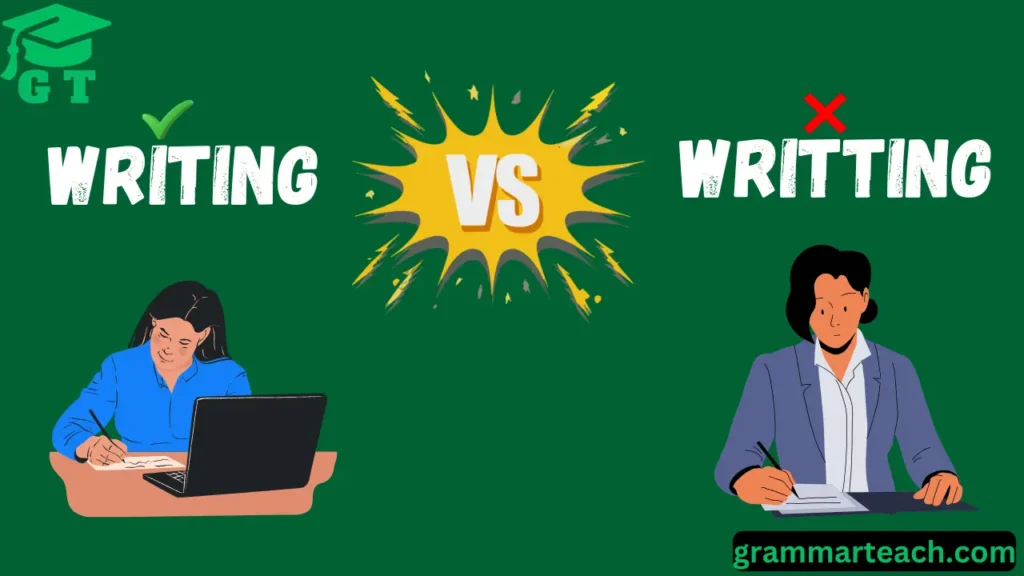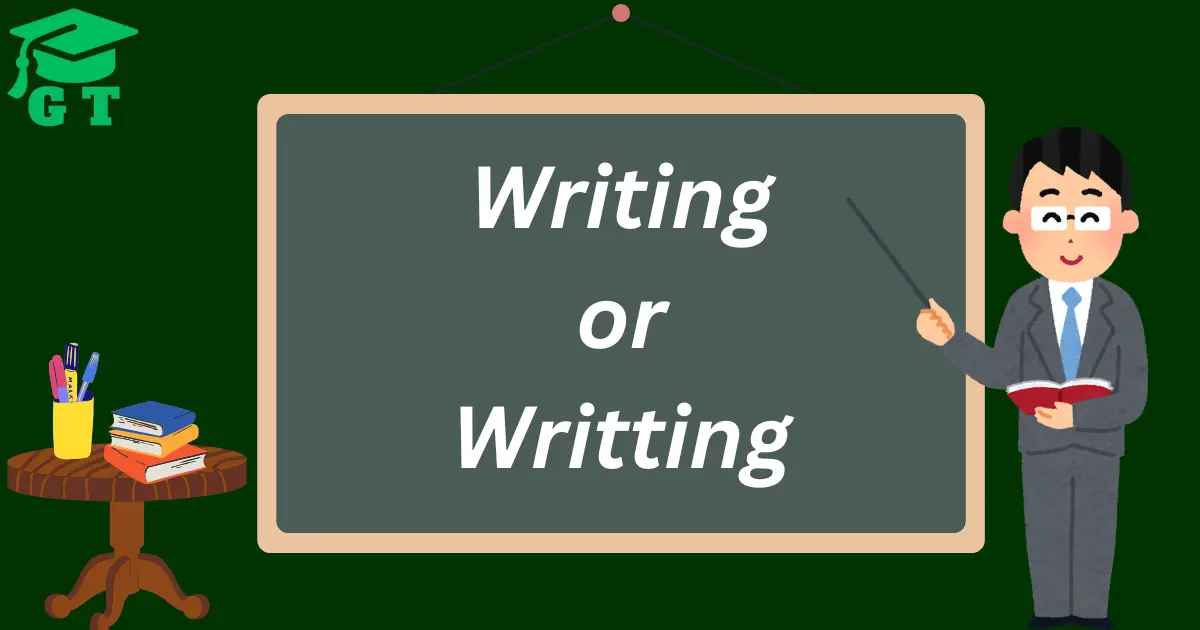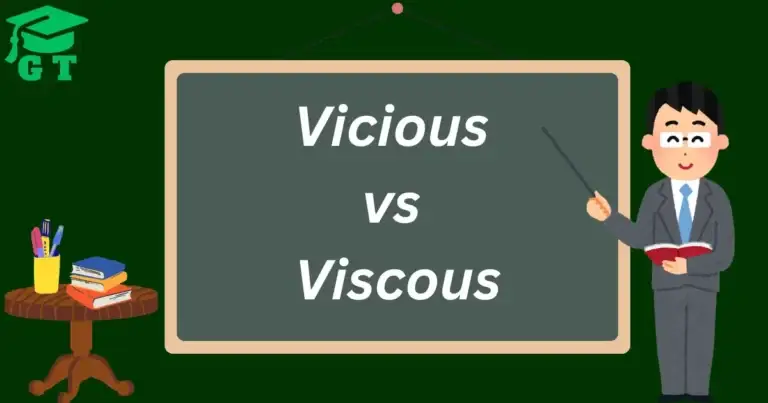Have you ever wondered whether “writing” or “writting” is correct? If so, you’re not alone! Many people get confused about the correct spelling of “writing” and mistakenly use “writting.” This article will help clear up the confusion by explaining the difference, providing examples, and offering tips to ensure you always use the correct spelling.
Whether you are a student, a professional writer, or simply someone who wants to improve your grammar, understanding the correct spelling of words is essential. This article will not only clarify the difference between “writing” and “writting,” but it will also provide a deep dive into spelling rules, common mistakes, and helpful memory techniques to avoid errors in the future.
Why Is There Confusion? “Writing” or “Writting”
The confusion between “writing” and “writting” arises due to English spelling rules related to verb conjugation. Some people mistakenly believe that the “t” in “write” should be doubled when adding “-ing,” similar to words like “hitting” or “sitting.” However, the correct rule for verbs ending in a silent “e” is to drop the “e” before adding “-ing.”
Why Do People Mistakenly Use “Writting”?
- Some assume doubling the “t” is necessary, as seen in words like “hitting” or “sitting.”
- Phonetic similarities cause confusion.
- Lack of familiarity with spelling rules leads to errors.
- Typing too fast can lead to accidental misspellings.
- The influence of other doubled consonant words like “getting” or “putting.”
“Writing” or “Writting”: Which is Correct?

The primary difference is simple: “writing” is the correct spelling, while “writting” is a common misspelling. The confusion arises due to how the root word “write” changes when forming the present participle.
Etymology of “Writing”
- “Writing” originates from the Old English “writan,” meaning to inscribe or record.
- The modern usage of “writing” follows standard English spelling rules, where verbs ending in a silent “e” drop the “e” before adding “-ing.”
- Other similar words that follow this pattern include:
- “Making” (from “make”)
- “Baking” (from “bake”)
- “Hiking” (from “hike”)
What Does “Writing” Truly Mean?
Definition
Writing is the act of forming letters, words, or sentences to communicate thoughts, ideas, or stories.
Usage in Sentences
- She enjoys writing poetry in her free time.
- The author spent years writing his novel.
- Writing skills are essential for effective communication.
Contextual Usage
- Used in both formal and informal settings.
- Essential in professional, academic, and creative fields.
- Applies to various forms such as blogging, essay writing, storytelling, and journaling.
What Is Writting?
“Writting” is an incorrect spelling and does not exist in standard English. If you see “writting” being used, it is a typo or an error.
Incorrect Usage in Sentences
- She enjoys writting poetry in her free time. ❌
- The author spent years writting his novel. ❌
- Writting skills are essential for effective communication. ❌
Read More: Of vs Off: Easy Guide to Know the Difference & Use Right
Key Differences Between Writing and Writting

| Aspect | Writing | Writting |
| Definition | The correct form of the word | A misspelling |
| Common Usage | Used in writing, literature, communication | Incorrect in all contexts |
| Context | Used formally and informally | Incorrect spelling |
| Grammar Role | Verb (present participle of “write”) | Nonexistent word |
| Common Mistakes | Sometimes mistaken for “writting” | Incorrectly used instead of “writing” |
Example Scenarios to Illustrate the Difference
Correct Usage
- “I am writing an email to my boss.”
- “She has been writing in her journal every night.”
- “Writing a book requires dedication and patience.”
Incorrect Usage
- “I am writting an email to my boss.” ❌
- “She has been writting in her journal every night.” ❌
- “Writting a book requires dedication and patience.” ❌
Words Following the Rules as Of “Writing”
The spelling rule applied to “writing” also applies to many other words that drop the silent “e” before adding “-ing.”
| Base Word | Correct -ing Form | Incorrect Form |
| Write | Writing | Writting |
| Bake | Baking | Bakkking |
| Make | Making | Makkking |
| Hike | Hiking | Hikkking |
| Type | Typing | Typping |
| Live | Living | Livving |
More Examples of Writing vs. Writting in Different Contexts
Formal Writing Examples
| Correct Sentence | Incorrect Sentence |
| She is writing a letter. | She is writting a letter. |
| Writing is an important skill. | Writting is an important skill. |
| The student excels in writing assignments. | The student excels in writting assignments. |
Informal Writing Examples
| Correct Sentence | Incorrect Sentence |
| I love writing in my journal. | I love writting in my journal. |
| Writing emails takes time. | Writting emails takes time. |
| He enjoys writing stories for fun. | He enjoys writting stories for fun. |
Synonyms & Antonyms
| Word | Synonyms | Antonyms |
| Writing | Composing, drafting, scripting | Erasing, speaking |
| Writting | (No synonyms, incorrect word) | (No antonyms) |
Which One Should You Use? (Practical Tips for Writers)
- Remember the Rule: Drop the “e” from “write” before adding “-ing.”
- Think of Other -ing Words: Compare “writing” to similar words like “coding” (from “code”).
- Use Spell Check: Most digital tools will flag “writting” as incorrect.
- Say It Out Loud: If a word doesn’t sound right, it might be spelled incorrectly.
- Make Flashcards: Learning new words through flashcards helps reinforce correct spelling.
- Write the Word Multiple Times: Repetition helps improve spelling memory.
Read More: Word vs Term: Easy Guide to Know the Difference & Use Right
Final Thoughts
Understanding the difference between “writing” and “writting” is crucial for effective communication. By following simple spelling rules, such as dropping the silent “e” before adding “-ing,” you can ensure accuracy in your writing. The correct spelling, “writing,” is widely used in formal, academic, and everyday communication, while “writting” is simply a common mistake.
Mastering proper spelling enhances your credibility and improves clarity in your writing. By using spell-check tools, practicing consistently, and applying memory techniques, you can avoid common errors and enhance your overall language skills. Keep refining your writing, and remember—every word you write contributes to your communication skills!




